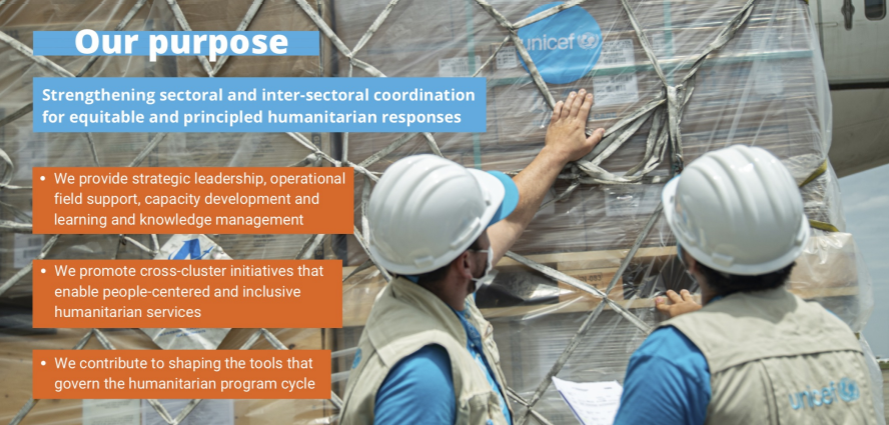GCCU is now GCCS!
The Global Cluster Coordination Unit is now the Global Cluster Coordination Section in EMOPS Geneva, aligning with the rest of the organizational structure.
AN AMBITIOUS LEARNING PROJECT
In 2021, UNICEF-led Global Clusters jointly worked on the development of their online learning platforms to bring humanitarian coordination learning opportunities to scale.
The first learning platform piloted at the end of 2021 was the Global Nutrition Cluster (GNC Learn) with more than 150 self-paced e-learning modules on nutrition coordination and information management. Launched initially as a COVID-19 project to move training online, about half of the pilot learners accessed from country sub-offices filling a longstanding gap. Field office staff is less likely to access international face-to-face learning opportunities, and a recent humanitarian skills assessment within UNICEF showed that humanitarian coordination remains a key area for knowledge development, particularly among national staff.
The second initiative is the GCCS information management (IM) e-modules. 75 per cent of IM competencies are the same across all UNICEF-led clusters, and the skills covered are highly transferable to other profiles. These include not only maps creation and other visualization, but also data collection, analysis, participation and partner capacity building, among many others. The content developed is modular, to serve the needs of multiple profiles and organizations’ learning paths. Almost 200 practitioners from UNICEF cluster, programme and M&E, as well as the Standby Partner network have signed up for piloting in March 2022. If successful, the approach may be pursued as a public good available to all partners, ideally with contributions from the broader humanitarian community.
GUIDANCE ON MINIMUM CAPACITY FOR CLUSTER TEAMS
As UNICEF seeks to make the changes recommended by the Humanitarian Review, staffing country clusters with the right capacity has become a major endeavour. The challenges identified through a current state analysis of cluster coordination will be further addressed through a dedicated talent management strategy for the UNICEF-led Clusters/AoR currently being finalised.
At the same time, urgent support to country offices was deemed necessary to address immediate gaps. The guidance on minimal structure for coordination teams —one of the components of the talent management strategy— was developed to ensure that coordination and information management functions are effectively fulfilled and maintained at national and sub-national levels to, ultimately, ensure more timely and relevant humanitarian responses. This guidance was presented and discussed with other clusters at IASC level and is envisioned as a living document as information and guidance is further defined through ongoing work on the talent management strategy.
UNICEF FINALIZES ITS SECOND CLUSTER LEAD AGENCY ROLE EVALUATION
The second Cluster Lead Agency Role Evaluation (CLARE II) concludes that UNICEF has generally delivered on the coordination responsibilities of its cluster lead agency (CLA) role and shows significant progress since the first global evaluation in 2013, especially in fulfilling its country-level cluster coordination responsibilities and in terms of staffing coordination and information management positions. However, it noted that there are still noticeable gaps in coordination positions at the country level (even up to 6 months) with frequent instances of “double-hatted” staff. Finally, the evaluation found that the humanitarian system relies on heavy processes that hinder strategic thinking, and on outdated guidance that needs to incorporate new realities and ways of doing business.
The evaluation concludes that UNICEF could have performed better in its leadership responsibilities and presents final recommendations aligned with the Humanitarian Review and organised around three key areas: 1) embracing, promoting and operationalizing UNICEF work on behalf of the collective of actors for the best outcomes for children in humanitarian settings; 2) better mainstreaming of CLA accountabilities into UNICEF systems; and 3) more proactively engaging in shaping the direction of the IASC on clusters as the agency with cluster lead responsibilities for the most clusters/AoR.
While actions to implement CLARE II recommendations are already underway, a management response will be validated by the Executive Board in June to address them in a holistic manner.
STRENGTHENING COORDINATION MECHANISMS FOR FUTURE OUTBREAKS: LESSONS LEARNED FROM THE COVID-19 RESPONSE
The Global Wash Cluster led in the analysis and compilation of lessons learned about coordination and information management during the COVID-19 pandemic with ideas on how they could be strengthened to support future outbreak responses relevant across all sectors. Main findings relate to the unprecedent rise in coordination needs during the pandemic due a proliferation of response actors, the multiplication of coordination platforms and the increased roles and responsibilities of national actors. Emerging opportunities for the future include the increased collaboration between humanitarian and development actors, leadership from government and local actors, and intersectoral work to improve sustainability. Remote working during the pandemic also opens opportunities for flexible coordination formats and diversification of participation.

For additional information on the work of each cluster/area of responsibility please click on the images below.
We would welcome your feedback on our newsletter!
Please share your thoughts with us.
If you encounter any issues while opening links, please contact us
Copyright © Global Cluster Coordination Section, All rights reserved.